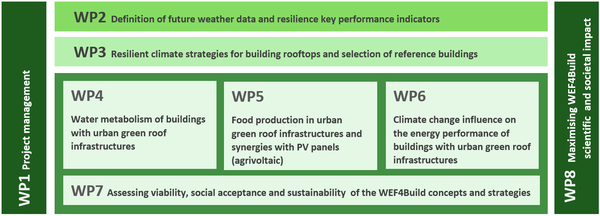HOME
Climate change is causing a wide range of problems and challenges around the world. One of the most significant impacts of climate change is the increase in global temperatures, which is causing more frequent and severe heat waves and droughts. At the building level, as temperatures rise, buildings will require more energy for cooling, which will further increase energy consumption and greenhouse gas emissions. However, lots of buildings lack cooling systems, and as a consequence, indoor overheating issues can increasingly occur. At the ecosystem level, climate change will also impact food production and water availability.

The urban agrivoltaics green strategy is expected to be crucial to (i) mitigate emissions, (ii) raise the climate resilience of buildings under future extreme weather conditions and move forward to more sustainable, and (iii) circular and liveable cities.
Buildings' rooftops constitute significant underutilised urban areas with direct exposure to sunlight. Until now, and within the context of the clean energy transition, they have been used to provide part of buildings' energy demand using photovoltaic solar panels. However, green roofs are becoming a promising possibility to increase the local food supply and enhance food security.
The main objective of the WEF4Build project is to boost buildings' climate resilience by implementing solutions based on the water-energy-food (WEF) nexus in buildings' rooftops. Rooftop WEF solutions devised in this project will be defined in a co-creation process covering:
- Photovoltaic panels installed on rooftops
- Basic hydroponic agriculture cultivation systems with different substrates
- Photovoltaic panels covering partially the crop system
- Advanced building-integrated rooftop greenhouse systems
- Advanced building-integrated rooftop greenhouse systems with semi-transparent photovoltaic panels or photovoltaic glass.
The WEF4Build project will evaluate the current and the future buildings’ energy performance when implementing rooftop WEF solutions considering different climate change projections. For this reason, firstly a set of future weather files to run building simulations considering the Catalan regional climate projections will be created. The water metabolism of buildings will be also analysed to assess the sustainability potential of water recirculation within buildings and explore the synergies between rain, wastewater and building-integrated agriculture. Food production in urban green roof infrastructures and synergies with photovoltaic panels will also be investigated. Finally, WEF4Build green-roof solutions will be evaluated under climate resilience criteria. The viability, sustainability, scalability and social acceptance of the WEF4Build project and strategies will also be assessed.
OBJECTIVES
The WEF4Build project aims to boost buildings' climate resilience with the use of water-food-energy nexus based solutions in buildings' rooftops as a mitigation and adaptation strategy. Specific objectives are listed below:
To determine a set of future weather files to run building simulations considering the Catalan regional climate projections.
To develop a set of rooftop WEF solutions to increase the climate building’s resilience of the Catalan building stock.
To model and assess the impact of the WEF4Build concepts related to short-chain water cycle.
To determine the synergies between photovoltaic panels and urban agriculture.
To model the energy performance of rooftop WEF solutions in buildings.
To analyse the viability and functionality of the WEF4Build concepts in terms of scalability and sustainable.
To demonstrate how the symbiosis between urban agriculture and buildings can make cities more sustainable and resilient to climate change
To assess the social acceptance of the WEF4Build concepts.
METHODOLOGY AND WORKPLAN
The work plan of the project is organized into 8 work packages (WP):
WP1 and WP8 are transversal WPs that will ensure the proper coordination of the project and the maximisation of the impact of the project results over society.
WP2 will develop future weather files based on climate projections. In addition, it will determine the Resilience Key Performance Indicators to assess the performance of the WEF solutions in buildings.
WP3 will develop the rooftop WEF solutions and will determine the reference buildings to assess the impact of the proposed solutions.
WP4, WP5 and WP6 will define, analyse and model the WEF4Build concepts in the water, food and energy domains.
Finally, in WP7, WEF4Build concepts and strategies will be analysed from the point of view of viability, social acceptance and sustainability.

RESULTS
Expected results of the project:
-
A set of future weather files under different climate change scenarios to support building performance simulations, derived from downscaling global climate models for the Catalan region.
-
A set of quantitative climate resilience indicators (RKPI) to evaluate building performance.
-
In-depth understanding of the synergies between waste flows generated in buildings and integrated greenhouses to enhance the sustainability of buildings and cities. This knowledge can lay the foundation for harnessing these synergies in the development and implementation of climate change mitigation and adaptation strategies.
-
A better understanding of how grey and yellow wastewater from buildings can be reused in the context of urban agriculture.
-
Insight into the synergies between agriculture and photovoltaics, contributing to the definition of agrivoltaics at a philosophical, practical, and regulatory level.
-
A deeper understanding of the effects of climate change on energy and water consumption in buildings and the associated costs.
-
Development of water-energy-food nexus-based solutions, integrating agriculture systems into building rooftops to increase the sustainability and climate resilience of buildings and cities, and demonstrating their feasibility.
-
Enhanced knowledge of how urban crops can reduce greenhouse gas emissions.
-
Guidelines on how to implement and operate rooftop solutions based on agrivoltaics.
-
Guidelines on the organization and governance of urban food production and distribution in cities.
FUNDING
This project is funded by the Department of Research and Universities, the Department of Climate Action, Food, and Rural Agenda, and the Climate Fund of the Government of Catalonia.
